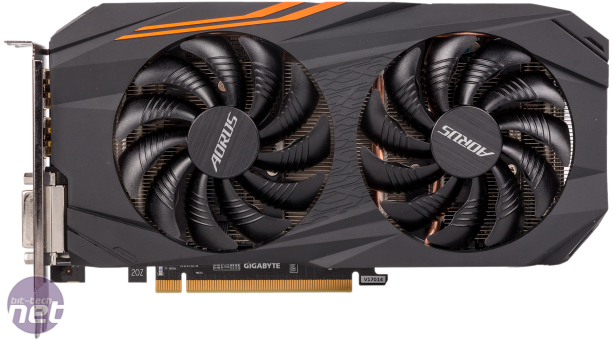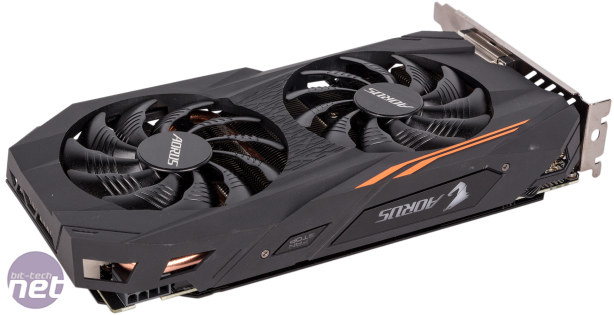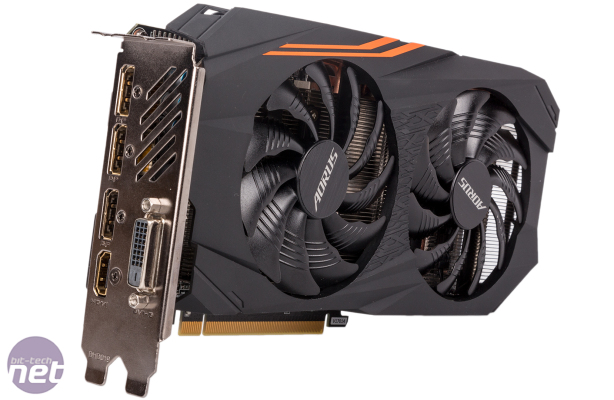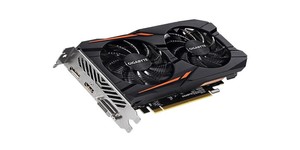Performance Analysis
Performance is more or less identical to the MSI RX 570 Gaming X 4G, which is no surprise since their default boost clocks are the same. As such, this is a card that demonstrates flawless performance in demanding games at 1080p and could even be pushed to 1440p on occasion, although as Deus Ex and Fallout show, this resolution could prove too much depending on the settings, and 4GB of VRAM is probably not the best long-term strategy if you have that many pixels on screen.Power consumption is right in-line with the MSI card as well and higher than we saw from a third-party RX 470, which makes total sense since the RX 570 is simply the RX 470 pushed a bit faster. Polaris' efficiency is looking a bit ropey next to Pascal now – this is one area where Nvidia undoubtedly reigns supreme.
A delta T of less than 50°C is healthy for long-term use, and the Aorus card maintains the 1,280MHz boost clock almost without a single dip, and the same is true of the 1,295MHz clock in OC Mode, so the cooler is clearly doing its thing well enough. OC Mode comes with a very small trade-off in fan speed to maintain the same temperature, although it's hard to tell it apart from Gaming Mode. We saw the fans fluctuate between 1,900 and 2,050 RPM, which produced more noise than we were happy with considering this isn't a particularly high-end part. It's definitely not loud, but we were expecting better.
Silent Mode actually does have an impact on noise, at least, capping the fans to around 1,300 RPM with the odd spike to 1,450 RPM or so, and it really is considerably quieter. The downside, though, is reduced performance. The boost clock of 1,244MHz is initially maintained but quickly drops off as the seemingly hard-coded fan limit means the only way to keep temperatures in check is to drop clock speeds to around 1,150MHz on average. You may be able to avoid this by setting a higher target temperature in Radeon WattMan, however.
Gains of four to seven percent were observed in benchmarks post-overclocking, which is nothing to write home about. The Polaris chips rarely overclock amazingly, and despite Aorus' best efforts with the PCB and cooling, the chip itself is likely to be the limit in most cases. Still, free performance is free performance, and when overclocked the card is fast enough to nip at the heels overclocked RX 580 and RX 480 cards.
Conclusion
As with the RX 480 and RX 470 before them, the RX 580 and RX 570 are really quite close in both performance and price, which makes the RX 570 a tough sale. We haven't been able to test an RX 580 4GB SKU yet – only 8GB ones – but for 1080p gameplay, at least, the difference between it and the 8GB one is likely to be minimal. We've seen RX 580 4GB cards for less than £200, and you get more and faster cores than you do with an RX 570 4GB like this one.Aorus does its best to justify the £180 price tag – factory overclock, well-rounded cooling solution, custom PCB components, RGB lighting – and it does come very close, but ultimately this is a hard card to recommend given the wider market. The MSI card we reviewed was bigger, even a little bit pricier, and only the same as this in terms of performance, but its cooler was much quieter, which gave it an edge that we know many will appreciate. Here, though, you can pay just £15 more and get an RX 580 4GB with a custom cooler that's probably similar to this one and a small but appreciated step up in performance. There's no outstanding design flaw here, and if £180 is your absolute limit, we can absolutely recommend it. However, the lack of a general recommendation is more just a case of Aorus being a victim of AMD's products being a little too close to each other in the stack - £165 for entry-level RX 570 4GB and £195 for basic RX 580 4GB SKUs gives board partners very little room to play with.

MSI MPG Velox 100R Chassis Review
October 14 2021 | 15:04












Want to comment? Please log in.